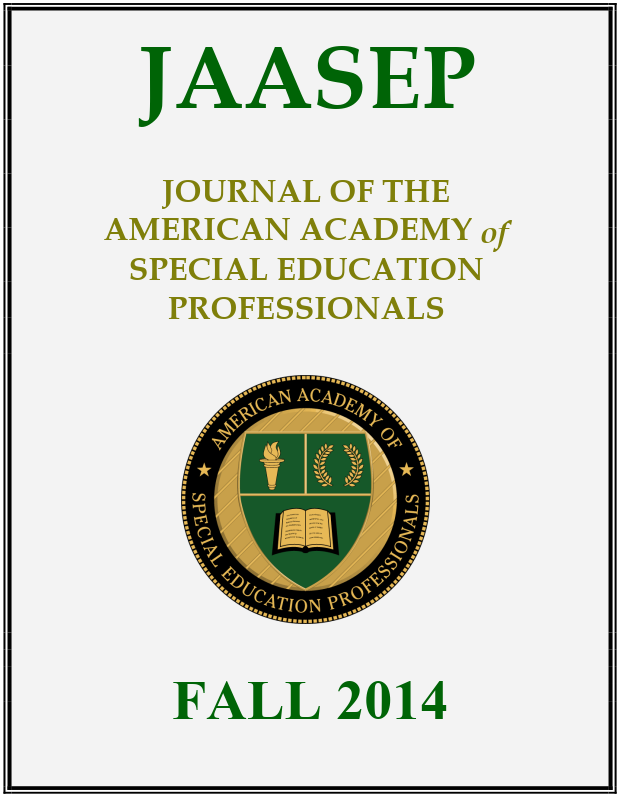African American Parental Beliefs About Resiliency: A Delphi Study
Barnette, J., Danielson, L., & Algozzine, R. (1978). Delphi methodology: An empirical investigation. Educational Research Quarterly, 3(1), 66-73.
Booker, K.C. (2004). Exploring school belonging and academic achievement in African American adolescents. Curriculum and Teaching Dialogue, 6, 131-143.
Brown, J.H. (2001). Systemic reform concerning resilience in education. TechTrends, 45(4), 47-54. DOI: https://doi.org/10.1007/BF02784825
Condly, S.J. (2006). A review of literature with implications for education. Resilience in Children, 41, 211-236. DOI: https://doi.org/10.1177/0042085906287902
Connell, J.P., Spencer, M.B., & Aber, J.L. (1994). Educational risk and resilience in African American youth: Context, self, action, and outcomes in school. Child Development, 65, 493-506. DOI: https://doi.org/10.1111/j.1467-8624.1994.tb00765.x
Daire, A.P., LaMothe, S., & Fuller, D.P. (2007). Differences between Black/African Americans and White college students regarding influences on high school completion, college attendance, and career choice. Brief Report, 55, 275-279. DOI: https://doi.org/10.1002/j.2161-0045.2007.tb00083.x
Ford, D.Y. (1994). Nurturing resilience in gifted black youth. Roeper Review, 17, 80-85. DOI: https://doi.org/10.1080/02783199409553630
Harvey, V.S. (2007). Raising resiliency school wide. The Education Digest, 72(7), 9-33.
International Resilience Project. Task Force on developing strategies to negotiate resilience. (n.d.). Retrieved October 12, 2007 from http://www.resilienceproject.org/index.cfm
Keogh, B., & Weisner, T.S. (1993). An ecocultural perspective on risk and protective factors in children’s development: Implications for learning disabilities. Learning Disabilities Research and Practice, 8, 3-10.
Kitano, M.K., & Lewis, R.B. (2005). Resilience and coping: Implications for children and youth at risk. Roper Review, 27, 200-205. DOI: https://doi.org/10.1080/02783190509554319
Lincoln, C.E. (1990). The Black church in the African American experience. Durham, NC: Duke University Press. DOI: https://doi.org/10.1515/9780822381648
Linstone, H.A., & Turoff, M. (2002). The Delphi method: Techniques and applications. Retrieved April 10, 2008, from New Jersey Institute of Technology Web site: http://is.njit.edu/pubs/delphibook/delphibook.pdf
Margalit, M. (2003). Resilience among individuals with learning disabilities: Proximal and distal influences, Learning Disabilities Research & Practice, 18, 82-86. DOI: https://doi.org/10.1111/1540-5826.00062
Martin, A.J., & Marsh, H. (2006). Academic resilience and its psychological and educational correlates: A construct validity approach. Psychology in the Schools, 43, 267-281. DOI: https://doi.org/10.1002/pits.20149
Miller, D. B., & MacIntosh, R. (1999). Promoting resilience in urban African American adolescents: Racial socialization and identity. Social Work Research, 2, 159-170. DOI: https://doi.org/10.1093/swr/23.3.159
Milstein, M.M., & Henry, D.A. (2000). Spreading resiliency: Making it happen for schools and communities. Thousand Oaks, CA: Corwin Press.
McCabe, S.E., Morales, M., Cranford, J.A. Delva, J., McPherson, M.D. & Boyd, C.J. (2007). Race/ethnicity and gender differences in drug use and abuse among college students. Journal of Ethnicity in Substance Abuse, 6, 75-95. DOI: https://doi.org/10.1300/J233v06n02_06
McCallister, A.D. (1992). Determining characteristics of the forest industry in the 21st century: A Delphi study with implications for agriculture education programs. Unpublished doctoral dissertation, University of Georgia, Athens, G.A.
Morrison, G.M., & Cosden, M.A. (1997). Risk, resilience and adjustment of individuals with learning disabilities. Learning Disabilities Quarterly, 20, 43-60. DOI: https://doi.org/10.2307/1511092
Murray, C. (2003). Risk factors, vulnerability, and resilience: A framework for understanding and supporting the adult transitions of youth with high-incidence disabilities, Remedial and Special Education, 24, 16-26. DOI: https://doi.org/10.1177/074193250302400102
National Center for Education Statistics. (2005) [Percentage of 16-24 year olds who were high school status dropouts, by race/ethnicity: 1989-2005. (NCES). Retrieved September 15, 2007, from http://nces.ed.gov/pubs2007
Nehiley, J. (2001). How to conduct a Delphi study. Abstract retrieved April 29, 2008, from http://extmarket.ufl.edu/FOCUS.html
Ogbu, J.U. (2004). Collective identity and the burden of ""Acting White"" in black history, community and education. The Urban Review, 36(1), 1-35. DOI: https://doi.org/10.1023/B:URRE.0000042734.83194.f6
Parker, G.R., Cowens, E.L., Work, W.C., & Wyman, P.A. (1990). Test correlates of stress resilience among urban school children. Journal of Primary Prevention, 11(1), 19-35. DOI: https://doi.org/10.1007/BF01324859
Patterson, J.M. (2002). Understanding family resilience. Journal of Clinical Psychology, 58, 233-246. DOI: https://doi.org/10.1002/jclp.10019
Payne, W.J. (1995). Directory of African American religious bodies: A compendium by the Howard University School of Divinity. Washington, DC; Howard University Press. Sagor, R. (1996). Building resiliency in students. Educational Leadership. 54, 38-43.
Smith, T.T., Lee, E., & McDade, H.L., (2001). An investigation of T-units in African American English-speaking fourth-grade children. Communication Disorders Quarterly 22, 148-157. DOI: https://doi.org/10.1177/152574010102200304
Spradley, J.P. (1980). Participant Observation. Independence: KY, Thomas Learning, Inc.
Streveler, R.A., Olds, B.M., Miller, R.L., & Nelson, M.A. (2003). Using a Delphi study to identify the most difficult concepts for students to master in thermal and transport science. Proceedings of the 2003 American Society for Engineering Annual Conferences & Exposition, Golden, CO, 1-9.
Wang, M.C., & Gordon, E. W. (1994). Educational resilience in inner-city America: Challenges and prospects. Hillsdale, NJ.: Lawrence Erlbaum Associates, Inc.
Waxman, H.C., Gray, J.P., & Padron, Y.N. (2003). Review of research on educational resilience (Research Report No. 11). Santa Cruz, University of California: The Center for Research on Education, Diversity and Excellence.
Werner, E.E., & Smith, R.S. (1992) Overcoming the odds: High risk children from birth to adulthood. New York: Cornell University Press. DOI: https://doi.org/10.7591/9781501711992
